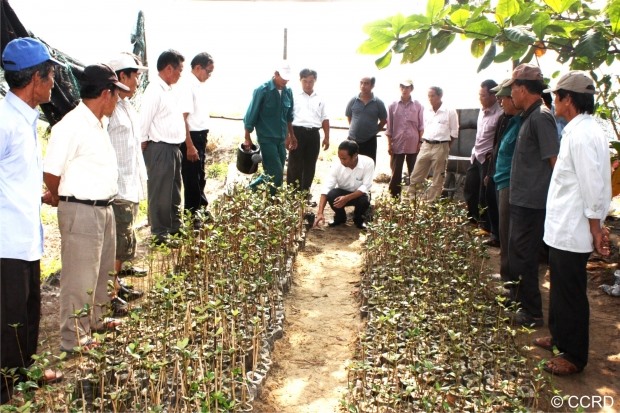 Environment
Environment

An environmental seminar entitle “Mangroves for the Future: Improving the Endurance Power of Ecosystem and Coastal Community – Sharing Knowledge And Experiences” was held on August 24 in Thạch Thất District.
 |
| A mangrove nursery established by the local fishing association in Hải Phòng City. — Photo Courtesy of MFF Việt Nam |
HÀ NỘI — An environmental seminar themed Mangroves for the Future: Improving the Endurance Power of Ecosystem and Coastal Community – Sharing Knowledge And Experiences was held on August 24 in Thạch Thất District.
The seminar was co-organised by the International Union for Conservation of Nature (IUCN) and the United Nations Development Programme Việt Nam (UNDP).
The seminar was held to summarise Phase 3, which included results and lessons learned during Mangroves for the Future (MFF), a partner-led initiative co-chaired by IUCN and UNDP to promote investment in coastal ecosystem conservation for sustainable development.
Following Phase 1 and 2, Phase 3 has been deployed in Việt Nam since the beginning of 2015.
Over 30 projects focused on the implementation of MFF Việt Nam on long-term sustainable coastal ecosystem management like climate change adaptation and mitigation, disaster risk reduction, ecosystem health, development of sustainable livelihoods, and the active engagement of the private sector in developing sustainable business pratices were briefly summarised at the seminar.
Doctor Vũ Thanh Ca, head of the Việt Nam National Co-ordinating Centre, said the MFF needed three solutions to develop the eco-system in Việt Nam: “We need natural resources, finance and loans to help local people live a better life, as well as providing support on policies and laws. We also need to educate fishermen so that they would no longer exhaust our sea resources or use explosives.”
Lê Vĩnh Thuận, head of the Chàm Islands Sea Reserve Management Board, said the participation of the local community in restoring and managing the coral reef was vital. “Fisherman union is significant to protecting the coral reef around the islands.”
Dương Ngọc Phước from the Research and Training Centre for Community Development (RTCCD) said it was important to raise people’s awareness of protecting and preserving the mangrove system in Việt Nam. “The awareness of local people is still low, so we need to educate them and issue clear and transparent regulations between individuals and local authorities. We also need to understand the mangroves and the coastal ecosystem for management purposes.”
Besides mangroves, MFF Việt Nam looks at all types of coastal ecosystems, like coral reefs, estuaries, lagoons, sandy beaches, sea grasses and wetlands.
After the seminar, it will focus on building ecosystem-dependent coastal communities by promoting nature-based solutions to protect and preserve the mangrove forests and other types of coastal vegetation. — VNS




